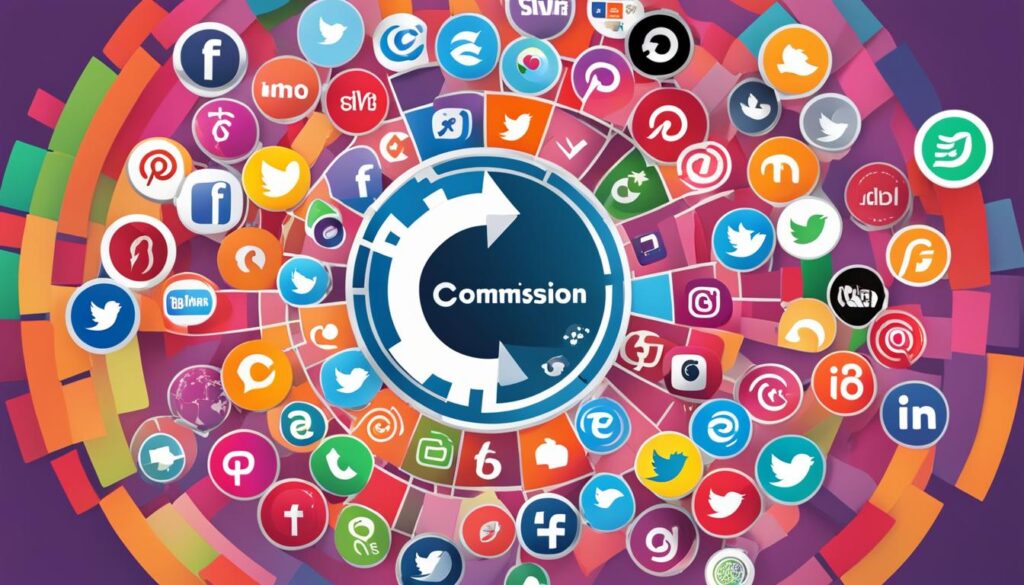Estimated reading time: 11 minutes
In the ever-evolving world of digital marketing, commission-based social media marketing has emerged as a highly effective working model. This approach involves a digital marketing company partnering with websites and mobile applications to promote and sell their products or services. Instead of paying a fixed fee, the company compensates these partners with a commission based on the sales generated through their efforts. This performance-based model not only benefits the digital marketing company but also provides an opportunity for partners to earn a steady income.
By leveraging the commission-based social media marketing model, businesses can tap into the vast potential of social media platforms and reach a wider audience. This approach allows for cost-effective advertising as companies only pay for the actual results achieved. It incentivizes marketers to perform at their best, driving sales and increasing revenue for the company and its partners.
Key Takeaways:
- Commission-based social media marketing is a performance-driven model that rewards partners based on the sales they generate.
- It offers a cost-effective advertising method as businesses only pay for actual results, eliminating upfront costs.
- This model allows businesses to increase brand exposure and reach a wider audience through social media platforms.
- Partners should carefully select affiliate programs and evaluate the commission structure to maximize earnings.
- Tracking conversions and analyzing key performance indicators are essential for measuring success and optimizing campaigns.
Companies that Work on a Commission-Based Model in Digital Marketing
Several companies work on a commission-based model in digital marketing. These companies partner with websites and mobile applications to sell their products or services. They create commission programs for their partners and pay them a commission based on the sales generated through the links and banners on these platforms. This model benefits both the digital marketing company and its partners, as it increases sales and revenue.
Some companies that operate on a commission-based model in digital marketing include ClickDealer, MaxBounty, Peerfly, CJ Affiliate, Rakuten Marketing, ShareASale, Amazon Associates, eBay Partner Network, Avangate Affiliate Network, and FlexOffers. These companies offer various commission percentages depending on the product or service being sold and the agreement between the company and its partners. By working with these companies, marketers can tap into their networks and reach a broader audience, thus increasing their chances of making more sales.
Partnering with a digital marketing company that operates on a commission-based model can be a lucrative opportunity for websites and mobile applications. By integrating links and banner ads these companies provide into their platforms, partners can earn a commission for each sale made through their platform. It’s important for companies and their partners to have a clear and defined commission structure in their partnership agreements to avoid any misunderstandings or disputes regarding payment.
| Company Name | Commission Percentage |
|---|---|
| ClickDealer | Up to 30% |
| MaxBounty | Varies |
| Peerfly | Varies |
| CJ Affiliate | Varies |
| Rakuten Marketing | Varies |
| ShareASale | Varies |
| Amazon Associates | Up to 10% |
| eBay Partner Network | Varies |
| Avangate Affiliate Network | Varies |
| FlexOffers | Varies |
Benefits of Commission-Based Social Media Marketing
Commission-based social media marketing offers several benefits to businesses. One of the key advantages is that it is a cost-effective advertising method. Unlike traditional forms of advertising, where businesses pay upfront costs regardless of the results, commission-based marketing allows businesses to only pay for actual sales or conversions. This means businesses can allocate their marketing budget more efficiently and maximize their return on investment. By eliminating upfront costs, commission-based social media marketing provides businesses with a more sustainable advertising model.
Another benefit of commission-based social media marketing is that it provides performance-based results. Marketers and affiliates are incentivized to generate sales or conversions because their earnings are directly tied to their performance. This motivates marketers to put in the effort and creativity to promote products or services effectively. It also aligns the interests of the business and the marketer, creating a win-win situation for both parties.
“Commission-based social media marketing allows businesses to reach a wider audience and increase their brand exposure. Social media platforms have a large user base, and by leveraging the influence of marketers and affiliates, businesses can tap into these audiences and gain visibility.”
Additionally, commission-based social media marketing allows businesses to increase their brand exposure. Social media platforms have a large user base, and by leveraging the influence of marketers and affiliates, businesses can tap into these audiences and gain visibility. Marketers can create engaging content and promote products or services to their followers, who, in turn, can share the content with their networks. This viral effect can significantly amplify the reach and impact of the marketing efforts, resulting in increased brand exposure and awareness.
| Benefits of Commission-Based Social Media Marketing | |
|---|---|
| Cost-effective advertising | Businesses only pay for results, eliminating upfront costs |
| Performance-based results | Marketers are incentivized to generate sales or conversions |
| Increased brand exposure | Tap into social media platforms’ large user base and leverage the influence of marketers and affiliates |
How Commission-Based Social Media Marketing Works
Commission-based social media marketing operates through affiliate programs and networks, allowing marketers to promote products or services and earn a commission for successful sales. To participate in commission-based marketing, marketers need to find suitable affiliate programs that align with their niche or target audience. They can join affiliate networks that provide a centralized platform for managing relationships with multiple programs and offer tools for tracking performance.
Once marketers have joined an affiliate program, they can start promoting products or services on social media platforms. This can be done by sharing unique affiliate links or discount codes that track their sales and commissions. By leveraging their social media presence and engaging their audience, marketers can drive traffic and generate sales for the products or services they are promoting.
By participating in commission-based social media marketing, marketers can earn a commission every time a sale is made through their promotional efforts. This model incentivizes marketers to create engaging content, build trust with their audience, and drive conversions. It allows businesses to tap into the power of social media and leverage the influence of marketers to reach a wider audience and increase their revenue.

Benefits of Commission-Based Social Media Marketing:
- Cost-effective advertising: Marketers only pay for results, eliminating upfront costs.
- Performance-based results: Marketers are incentivized to generate sales and drive conversions.
- Increased brand exposure: Leveraging the large user base of social media platforms helps businesses reach new customers and create buzz around their products or services.
In summary, commission-based social media marketing allows marketers to participate in affiliate programs and promote products or services on social media platforms. Marketers earn a commission for successful sales made through their promotional efforts. This model offers several benefits, including cost-effective advertising, performance-based results, and increased brand exposure.
Choosing the Right Social Media Platforms for Commission-Based Marketing
When it comes to commission-based marketing, selecting the right social media platforms is crucial for reaching your target audience effectively. Each platform has its unique user base and engagement patterns, making it essential to choose wisely. Here are some considerations to keep in mind:
- Target Audience: Identify the demographics and interests of your target audience. This information will help you determine which platforms they are more likely to be active on. For example, if you’re targeting a younger audience, platforms like Instagram and TikTok may be more suitable.
- Platform Engagement: Evaluate the level of engagement on different platforms. Look at factors such as user activity, average time spent on the platform, and the types of content that perform well. This will help you gauge the potential reach and effectiveness of your marketing efforts.
- Content Format: Consider the type of content that resonates with your target audience and aligns with your marketing goals. Some platforms are better suited for visual content, such as Instagram and Pinterest, while others, like LinkedIn, focus more on professional networking and industry-specific content.

“Choosing the right social media platform is a strategic decision that can have a significant impact on the success of your commission-based marketing efforts.” –
By carefully evaluating these factors, you can decide which social media platforms to prioritize in your commission-based marketing strategy. Remember, it’s not about being present on every platform but rather about focusing on the platforms that offer the greatest potential for reaching and engaging with your target audience.
Making the Right Choice
Once you have analyzed your target audience, engagement patterns, and content preferences, it’s time to choose. Here is a table summarizing the characteristics of popular social media platforms for commission-based marketing:
| Platform | Target Audience | Engagement | Content Format |
|---|---|---|---|
| Wide range of demographics | High | Text, images, videos | |
| Youthful demographic, primarily visual content | High | Images, videos, stories | |
| YouTube | Wide range of demographics, video-centric | High | Videos, tutorials, reviews |
| Primarily female audience, visual content | Medium | Images, infographics |
Remember, this table is just a starting point. It’s essential to dive deeper into platform analytics and conduct audience research to make data-driven decisions that align with your specific business objectives.
Strategies for Successful Commission-Based Social Media Marketing
Commission-based social media marketing requires a thoughtful approach and a combination of strategies to succeed. As a marketer, I have found that focusing on the following key elements can significantly enhance the effectiveness of this model:
1. Creating High-Quality Content:
Producing engaging and informative content is paramount in commission-based social media marketing. By crafting compelling blogs, videos, and social media posts, I can capture the attention of my target audience and establish myself as an authority in my niche. This builds trust and credibility, ensuring that my audience is likelier to engage with the products or services I promote.
2. Building a Strong Personal Brand:
In the competitive world of social media marketing, having a strong personal brand sets me apart from the crowd. By consistently showcasing my expertise, values, and unique perspective, I can attract a loyal following and foster authentic connections with my audience. A strong personal brand also ensures that my promotions resonate with my target audience, increasing the likelihood of conversions.
3. Engaging with Followers:
Interacting and engaging with my followers is essential for nurturing relationships and building a loyal community. By responding to comments, messages, and inquiries promptly, I demonstrate that I value my audience’s input and care about their needs. This level of engagement not only strengthens the relationship between myself and my followers but also encourages word-of-mouth promotion and positive brand associations.
4. Leveraging Influencer Marketing:
Influencer marketing can be a powerful tool in commission-based social media marketing. Collaborating with influencers with a strong following in my niche helps me tap into their established communities and reach a wider audience. By leveraging their influence and credibility, I can introduce my promoted products or services to a highly engaged and receptive audience, increasing the chances of conversions and sales.

Conclusion
Commission-based social media marketing is a powerful and effective model that allows businesses to increase sales and reach a wider audience. By partnering with websites and mobile applications, companies can leverage the commission structure to incentivize marketers and drive performance-based results. This model benefits not only the digital marketing company but also its partners, creating a win-win situation for both parties.
One of the key advantages of commission-based social media marketing is its cost-effectiveness. Businesses only pay for results, eliminating upfront costs and maximizing the return on investment. Additionally, this model provides an opportunity for increased brand exposure and reach, as social media platforms have a large user base. Through strategic targeting and engaging content, marketers can tap into these platforms to reach new customers and generate buzz around their products or services.
To succeed in commission-based social media marketing, marketers should create high-quality content that resonates with their target audience. Building a strong personal brand is crucial for gaining trust and credibility. Engaging with followers and leveraging influencer marketing can also help extend the reach and tap into established communities.
Measuring success in commission-based social media marketing involves tracking conversions and analyzing key performance indicators. By adjusting strategies based on data insights, marketers can optimize their campaigns and improve results over time. Commission-based social media marketing offers a lucrative opportunity for businesses looking to grow their customer base and boost sales in today’s digital landscape.
FAQ
What is commission-based social media marketing?
Commission-based social media marketing is a working model in digital marketing where a company partners with websites and mobile applications to sell its products or services. The company pays a commission to these partners based on the sales made through the links and banner ads provided by them.
Which companies work on a commission-based model in digital marketing?
Some companies that work on a commission-based model in digital marketing include ClickDealer, MaxBounty, Peerfly, CJ Affiliate, Rakuten Marketing, ShareASale, Amazon Associates, eBay Partner Network, Avangate Affiliate Network, and FlexOffers.
What are the benefits of commission-based social media marketing?
Commission-based social media marketing offers cost-effective advertising, performance-based results, and increased brand exposure. It allows businesses to reach a wider audience and generate sales without upfront costs.
How does commission-based social media marketing work?
Marketers join affiliate programs or networks, promote products or services on social media platforms using unique affiliate links or discount codes, and earn a commission based on the sales generated through these links.
How do I choose the right social media platforms for commission-based marketing?
Consider the demographics and engagement of your target audience on different platforms. Popular platforms for commission-based marketing include Facebook, Instagram, YouTube, and Pinterest.
What strategies can I use for successful commission-based social media marketing?
Focus on creating high-quality content, build a strong personal brand, engage with followers and customers, and leverage influencer marketing to extend your reach.
How can I find profitable commission-based opportunities?
Conduct niche research to identify areas with high demand and profit margins, evaluate the credibility of affiliate programs, and analyze commission structures to understand the earning potential.
What challenges may I face in commission-based social media marketing?
Maintaining authenticity and trust, differentiating yourself in competitive markets, and tracking and optimizing performance metrics are common challenges in commission-based social media marketing.
How do I measure success in commission-based social media marketing?
Measure success by tracking conversions and sales through affiliate tracking tools, analyzing key performance indicators such as click-through rates and engagement rates, and adjusting strategies based on data insights.
Source Links
- https://jamsedblog.com/commission-based-social-media-marketing/
- https://www.linkedin.com/pulse/commission-based-model-popular-working-field-digital-hamed-aghayan
- https://helpfulmarketing.io/commission-based-digital-marketing/

James Dunnington leads the James Dunnington Collection, featuring five unique blogs: a practical Pet Care Guide, an enlightening Ancient History Blog, a resourceful Home Improvement Guide, a cutting-edge Tech Innovation Guide, and a strategic Online Money Making platform. Each site delivers valuable insights designed to empower and inform. For updates and more tips, visit our Contact Us page to sign up for our newsletter, ensuring you never miss out on the latest content from any of these dynamic fields.
